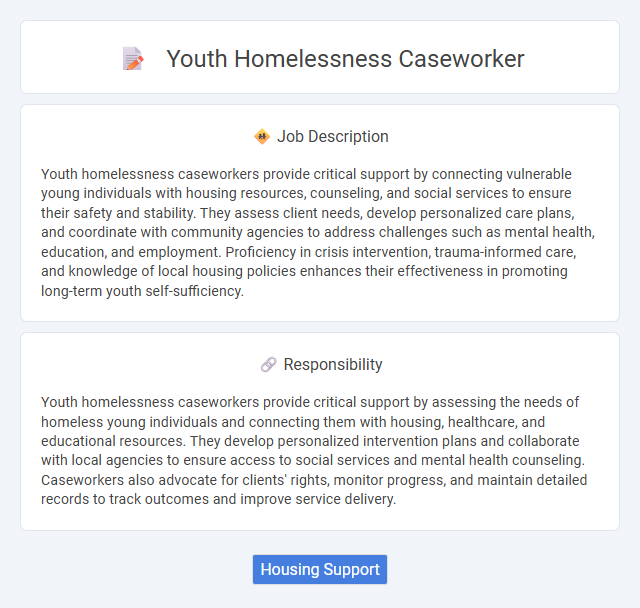
Youth homelessness caseworkers provide critical support by connecting vulnerable young individuals with housing resources, counseling, and social services to ensure their safety and stability. They assess client needs, develop personalized care plans, and coordinate with community agencies to address challenges such as mental health, education, and employment. Proficiency in crisis intervention, trauma-informed care, and knowledge of local housing policies enhances their effectiveness in promoting long-term youth self-sufficiency.
Youth experiencing homelessness often face complex challenges such as mental health issues, trauma, and unstable living environments, which may make working as a caseworker demanding and emotionally taxing. Individuals with strong empathy, resilience, and the ability to manage stress are more likely to be suitable for this role. Those lacking patience or emotional stability may find it difficult to effectively support and advocate for these vulnerable populations.
Qualification
A Youth Homelessness Caseworker typically requires a bachelor's degree in social work, psychology, or a related human services field, alongside experience working with at-risk youth populations. Strong knowledge of mental health issues, substance abuse, and trauma-informed care principles is essential for effective intervention and support. Certification in trauma response or crisis intervention can enhance a caseworker's qualifications and improve client outcomes.
Responsibility
Youth homelessness caseworkers provide critical support by assessing the needs of homeless young individuals and connecting them with housing, healthcare, and educational resources. They develop personalized intervention plans and collaborate with local agencies to ensure access to social services and mental health counseling. Caseworkers also advocate for clients' rights, monitor progress, and maintain detailed records to track outcomes and improve service delivery.
Benefit
Youth homelessness caseworkers likely provide critical support by connecting vulnerable young people to housing resources, counseling services, and educational opportunities that can improve long-term stability. Their role probably enhances community well-being by reducing homelessness rates and preventing future crises. Effective casework may increase youths' chances of achieving independence and self-sufficiency, resulting in broader social and economic benefits.
Challenge
Youth homelessness caseworkers likely face significant challenges related to high caseloads and limited resources, which may impact their ability to provide consistent, personalized support. The complexity of individual youths' situations, including trauma and mental health issues, could increase the difficulty of developing effective intervention plans. Navigating coordination between different social services and agencies may require strong organizational skills and resilience to overcome bureaucratic obstacles.
Career Advancement
Youth homelessness caseworkers gain valuable experience in crisis intervention, resource coordination, and advocacy, positioning themselves for leadership roles in social services. Specialized training in mental health support and housing policy enhances career prospects in program management or policy development. Advancing within nonprofit organizations or government agencies often involves supervising teams or leading outreach initiatives targeting at-risk youth populations.
Key Terms
Housing Support
Youth homelessness caseworkers specialize in providing comprehensive housing support to vulnerable young individuals, ensuring access to safe and stable accommodations. They coordinate with local shelters, social services, and housing authorities to develop personalized housing plans that address immediate needs and long-term stability. Expertise in crisis intervention and resource navigation is essential to successfully transition homeless youth into sustainable living environments.
 kuljobs.com
kuljobs.com